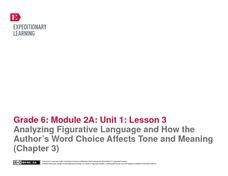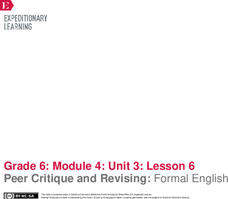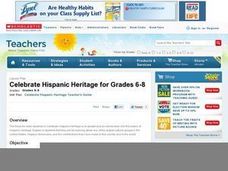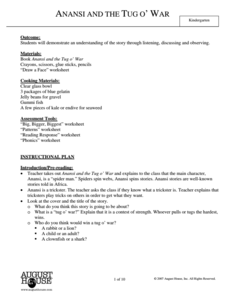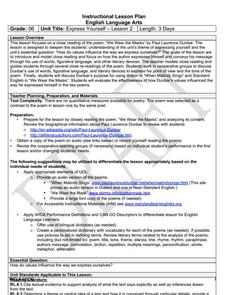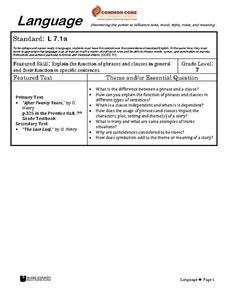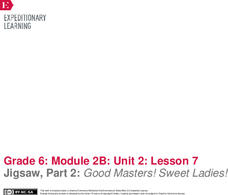EngageNY
Analyzing Figurative Language and How the Author’s Word Choice Affects Tone and Meaning (Chapter 3)
How figurative language affects the tone and meaning in Chapter Three of Christopher Paul Curtis' Bud, Not Buddy is the focus of a series of exercises that ask readers to locate, record, and analyze Curtis' word choices.
Houghton Mifflin Harcourt
Nature Walk: English Language Development Lessons (Theme 2)
Walking in nature is the theme of a unit designed to support English language development lessons. Scholars look, write, speak, and move to explore topics such as camping, woodland animals, instruments, bodies of water, things found at a...
Star Wars in the Classroom
"Shakespeare and Star Wars": Lesson Plan Day 3
To make the point that there are many forms of language, each with its own purpose, class members select 10 lines from Doescher's play, translate these lines first into contemporary English and then into "SMS/Tweet."
EngageNY
Peer Critique and Revising: Formal English
Dear Sir or Madam: What's the difference between formal and informal language? Scholars focus on using formal English and transitions in their position papers. After revising their rough drafts, they engage in the peer editing process...
Illinois State Board of Education
Common Core Teaching and Learning Strategies
Here's a resource that deserves a place in your curriculum library, whether or not your school has adopted the Common Core. Designed for middle and high school language arts classes, the packet is packed with teaching tips, materials,...
Curated OER
Celebrate Hispanic Heritage: Grades 6-8
To gain a better understanding of Hispanic heritage and culture, as well as to build informational comprehension skill, learners explore facets of Hispanic American History. They engage in a class discussion, research three facts, and...
Curated OER
Reading Poetry in the Middle Grades
Bring the beauty of "Nothing Gold Can Stay" by Robert Frost to middle school language arts. After learners read a copy of the poem, they follow an instructional sequence that focuses on sound, figurative language, and theme.
EngageNY
Writing: Drafting Body Paragraphs and Revising for Language
Begin the drafting phase of the writing process with a lesson plan focused on logically writing three body paragraphs. Then, revise the writing to make it more formal after a teacher-directed mini-lesson plan. Each paragraph highlights...
EngageNY
Carl Hiaasen’s Perspective of Florida: Part 3
What is your perspective? Scholars read Florida: A Paradise of Scandals Excerpt 2 and look for unfamiliar words. They determine author perspective by completing Gathering Evidence of Hiaasen’s
Perspective: Part three graphic organizer...
Santa Clara County Office of Education
The Rainbow Fish: Activities for Parents to Do with Children at Home
The Rainbow Fish, Marcus Pfister's award-winning story about the joys of sharing, is the inspiration for this resource loaded with fun. Suggestions for language and language arts, math, science, and social studies activities are included...
Curated OER
Guided Reading: Three Little Pigs (Plus Wolf: Javalinas)
Guide your class through reading various versions of The Three Little Pigs. Talk about the traditional story line and then discuss a different point of view: Maybe the wolf was just an innocent bystander! This lesson plan, which has...
EngageNY
Looking Closely at Stanza 3—Identifying Rules to Live By Communicated in “If”
Just as Bud, from the novel Bud, Not Buddy by Christopher Paul Curtis, had rules to live by, so does the poem, If by Rudyard Kipling, but how do the two relate? Pupils delve deep into the poem's third stanza, participate in a grand...
August House
Anansi and the Tug o' War
Combine art, math, language arts, drama, and delicious Jell-o with a instructional activity based on the African folktale Anansi and the Tug o' War. Kids make predictions and discuss plot points of the story before joining in...
EngageNY
Inferring about Character: Close Reading of The Lightning Thief (Chapter 3)
Stick it to them! Scholars work to write the gist of sections of text on sticky notes and place them in chapter three of The Lightning Thief. They then share what they wrote with classmates in their triad. The group reads selections of...
EngageNY
Vocabulary Strategies and Questions from the Text: Close Reading Part 2 of The Lightning Thief (Chapter 3, Continued)
That is very unexpected! Scholars take a close look at the word unexpectedly from chapter three of The Lightning Thief. They examine the prefix and think of other words that have the same prefix. Learners regroup in their triads and take...
EngageNY
Building Background Knowledge About the Hero’s Journey, Part 2: Acts 2 and 3 Plus Focusing on Key Vocabulary in “The Hero’s Journey”
It's all in the details. Scholars read acts two and three of The Hero's Journey and collect important details from the text. They share their notes with their peers and listen for key words from the story. They then turn their attention...
EngageNY
End of Unit 3 Assessment: Drafting the Newspaper Article
Choose your words carefully. Scholars continue looking at the creation of a newspaper article by examining word choice. They highlight key verbs, vocabulary, and descriptive words in the model article Sandy wreaks havoc across
Northeast;...
Curated OER
Descriptive Writing: Using Art to Inspire description
Write with the senses! Try using art to inspire writers to consider all of the senses. Here, the class is divided in half. Each group looks at one of two images, imagines the senses that would be engaged, and records answers to five...
Curated OER
6th Grade: Express Yourself, Lesson 2: Close Read
The second instructional activity of a pair about Paul Laurence Dunbar, this plan focuses in particular on his poem, "We Wear the Masks." After a short historical introduction, class members conduct a series or readings, marking up the...
Children's Theatre of Cincinnati
A Charlie Brown Christmas Study Guide
Bring A Charlie Brown Christmas to social studies, language arts, math, science, and art class! Learners ponder the meaning of Christmas trees, write about Christmas during the original release of the television special, research holiday...
Wake County Public Schools
Language
Have your class doing everything from reading literature, analyzing literary devices, identifying independent and dependent clauses, discussing, and writing creatively with the rich resource found here. After a mini lesson on independent...
J. Paul Getty Trust
Looking and Learning in the Art Museum — Lesson 1
To prepare for a field trip to a local art museum, art class members journal their initial reactions to a reproduction of the work they will focus on during their visit. The whole class then considers the artistic elements in the piece...
EngageNY
Jigsaw, Part 2: Good Masters! Sweet Ladies!
Three heads are better than one. Scholars gather back in their triads for another read of their monologues. They answer text-dependent questions and review their work. Learners then present their jigsaw monologues to the rest of the class.
Curated OER
Using Context Clues
Middle schoolers receive a handout that lists the five types of context clues. The class divides up into groups of three or four, and each group chooses five unfamiliar words. They write a multiple-choice question for each of their five...


